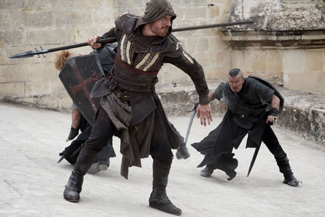The 400-Word Review: Assassin's Creed
By Sean Collier
December 23, 2016
BoxOfficeProphets.com

According to Rotten Tomatoes (an admittedly dubious source, but fine for the sake of this argument), the most critically accepted video game adaptation of all time is 2001's Final Fantasy: The Spirits Within, which managed to satisfy 44% of critics ... en route to becoming one of the most notorious box-office bombs of all time. Somehow, this year's dismal Angry Birds Movie gave 43% of its reviewers something to like; no other video game adaptation, ever, has even hit the 40% mark on the Tomatometer.
To oversimplify, the conversion process hasn't yet been worked out. Modern video games have hours of what could be called plot sandwiched in between even more hours of action; reducing, distilling and translating those tales into feature films is a process for which no formula yet exists. It's a trend that carries through Assassin's Creed, the latest big-budget adaptation of a popular game to widely miss the mark.
Callum Lynch (Michael Fassbender) turned to a life of crime after his mother was murdered by his curiously costume-clad father in the early 1980s. Now on death row, he's shocked to find himself still alive after his execution; he's been whisked to a high-tech research facility by Sophia Rikkin (Marion Cotillard), who needs his help with some sci-fi mumbo-jumbo.
See, if she straps him into this contraption, he can experience the memories of his ancestors - including Aguilar de Nerha, a 15th-century member of an exclusive order dedicated to preventing the world from calamity at the hands of the Knights Templar. If he finds out what happened to a macguffin in the 15th century, it'll help the 21st century, yada yada yada.
The initial flaw here is that most of the film is set in modern times, rather than take full advantage of the period-swashbuckling aesthetic that makes the games effective (and, while none of Assassin's Creed works, the throwback scenes undoubtedly work better). The fatal flaw, though, is a hopelessly self-serious attitude. The film is utterly humorous and deadly intense; this is meant to give the proceedings some measure of gravitas, but instead renders them hopelessly boring.
Fassbender and Cotillard give it an honest go, as does Jeremy Irons (no, really, Jeremy Irons), but there's no saving this hopeless, bleak slog.
My Rating: 2/10
Sean Collier is the Associate Editor of Pittsburgh Magazine and a member of the Broadcast Film Critics Association. Read more from Sean at pittsburghmagazine.com/afterdark